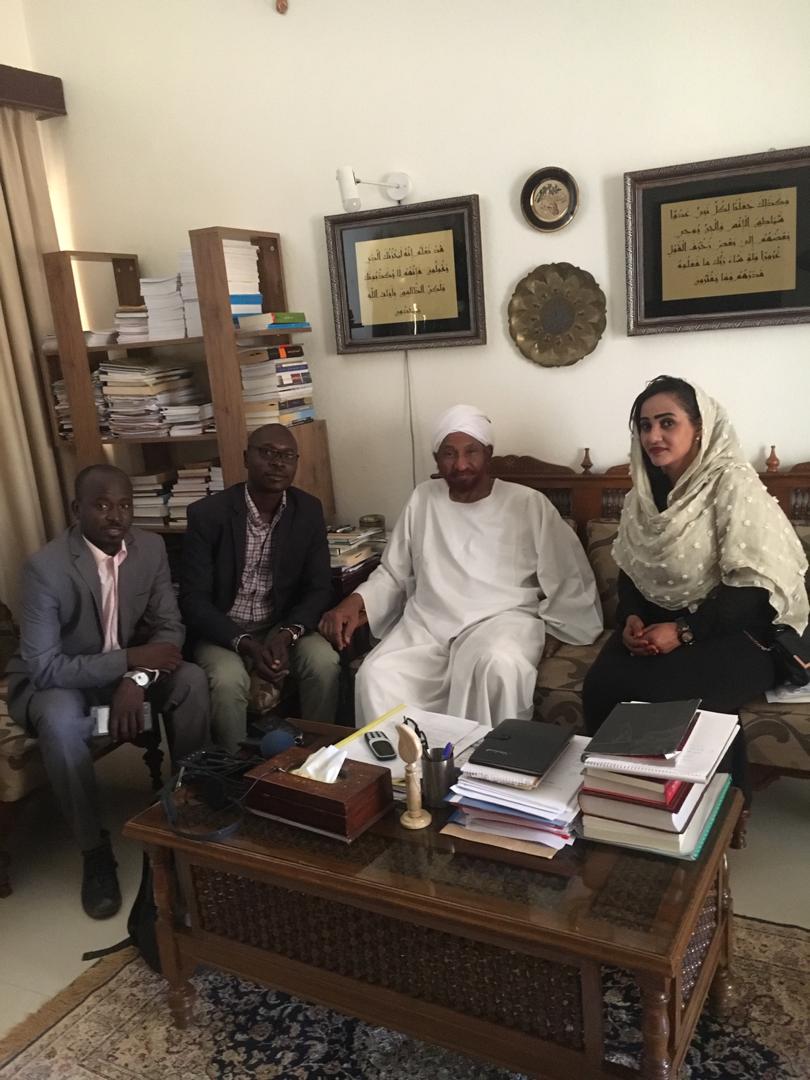“Khartoum Today “ conducted a comprehensive interview with President of National Uma Party (NUP) Al-Sadig Al-Mahdi dealt with political status-quo as well as the development following seven months of formation cilian-led government due to challenges outstanding issues with FFC coalition . Al-mahdi spoke high and spoke out
By: Michael, Mustafa & Elham
Thank you for availing your time speaking for us . To begin, what is your evaluation to the few months of the transitional period in Sudan?
I welcome Khartoum Today as a new journo and I hope you succeed in serving public opinion in Sudan. The main features of what happened in Sudan are; there was a continuous rejection of Bashir’s regime for thirty years. And this rejection took several forms. However, when change did arrive, it was sudden and abrupt. Therefore, there was no prepared program for dealing with the change. Although, the expectation of the change was there, the work for it was there, but the actual event took place suddenly.
This, off course, reflected itself in the fact that there were several power centers. One power center was the Transitional Military Council, the revolutionary movement and the third was the organized political forces. The three entered into a partnership, which reflected itself in the constitutional arrangement for the transitional period. But it is very nature this change, therefore, it is formed by tri partied partnership. Therefore, it is liable to much dealing with this transitional period.
How do you see the partnership?
So far, the partnership is holding. But it is facing an uphill struggle. Why? Because, the legacy of the outgoing regime is so great in its negative aspect that it is very difficult to deal with. The fact that there are several war front, the fact that there is collapse in the economy, the fact that Sudan is actually isolated internationally. Those are the issues that constitute the legacy from Bashir. I think, therefore, my characterization of the present situation is that it is full promises and full crises. The challenge to the tri partied partnership is to see how to face the crises and to realize the promise.
Who has the upper hand in the partnership in driving the transitional period?
This is an interested question. Upper hand can be define in arms, so, it is the military. It can be define in the revolutionary zeal, then, it is the revolutionary movement, can be define as an organize political opinion. They cannot really work, except together. Because, there is no way any of the three could overpower the other forces that have affected the change. So, I think, it is going to be a partnership relationship. Hopefully, that it can result into three basic achievements. First one is peace. All the forces that wen to form a military resistance accept a peace agreement, that could be an achievement for transitional period. Secondly, the need for facing the collapse of the economy so that it reaches to a workable economy. And thirdly, that the whole partnership be steered towards the end of the transitional [period] in the specified period, so that the third face of the revolution anticipated by everyone is a free general election.
Why?
Because, so far, the legitimacy that can characterized the partnership, is a practical ad hoc legitimacy, not a genuine legitimacy. So, the practical ad hoc legitimacy will work for the transitional period but the ultimate goal is to refer to the judgment of the people through free general election.
The achievement of the partnership will be how to hold the ring together for the period of transition, so that the government of Sudan will be legitimate in terms of the democratic vote.
Do you see any positive steps been taken by the transitional period towards holding a national election in the country?
As far as things go, the main achievement is that fact that we got different forces to work together. This is a blessing because it might not have worked that way. Secondly, so far, we got the three to agree upon a program for the transitional. Again this is something that could have led to some kind of up man ship. But now, there is an agreement about how to deal with matters. Again, this, I think, a great achievement. Thirdly, there is no doubt whatsoever, the great achievement is that so far, the hopefulness of the people and the optimism is great. And this is a great psychological achievement.
Fourthly, you can say, that Sudan started to normalize its relations with the International Community. During Bashir’s time, Sudan has reached a point of isolated system. Now, there are signs of normalization with the International Community. Many countries in the World will not deal with Sudan so long as Sudan has a negative attitude to the ICC. The ICC has become now part of the International Criminal Law. No one could normalize [a relationship] with Bashir’s regime because, he was indicted as a criminal. And therefore, even if a delegation comes to visit Sudan, they can talk to anyone accept Al Bashir. And this is a great slap in the face of the president. Now there is this, what we may call growing normalization between Sudan and the International Community. I think, those can be now described as the achievement of this period.
What is your opinion on the recent decision made by the government, to cooperate with the ICC that Al Bashir should appear before the court?
This is natural. Al Bashir, during his reign of office resisted this. Now, there is no point in doubting that he has indicted by the ICC that his regime has committed atrocities.
I have led a delegation to Darfur in June 2004 and before any of the movements, concerning the ICC at the time, I have come here and held a press conference which I said, “Atrocities have been committed in Darfur. Either immediately, they are investigated and justice done, or the International Community will move. After that, the Security Council sent a delegation that visited Darfur that wrote a report about the atrocities in Darfur. That report by the delegation of the Security Council led the SC considering the report and deciding resolution 1593, to take Al Bashir and others to the ICC. So, the decision to transfer Al Bashir and other officials was taken unanimously by members of the Security Council. So, this a clear evidence by which, legitimate steps were taken to present Al Bashir and others to the ICC.
How do you see the process of the transitional justice in Sudan?
Well, we have written a document about this how to dismantle the old regime. The fact is that people talk about a deep state. There was no deep state. The state was sabotage. There was no state at all. You talks of a deep state like in America, where the executive faces the legislative, faces the free public opinion and faces the judiciary and so on. Here, there wasn’t such a thing. What was there was that the ruling party or the National Congress party, got the benefit of resources of the government. In terms of vehicles, headquarters and many other benefits.
Secondly, the fact that their personnel were appointed in the different offices of the state, mostly civil service, the organize service and the diplomatic service. So, here again, is this aspect of unjust position for the ruling party.
Thirdly, they created some kind of parrel organizations of Militia. So, they have to be dismantled. Again, they set up companies which were favored; in terms of customs, in terms of taxes and so on. Again, what they had was many NGOs which were NGOs, apparently, but in reality they were partisan with their relationship with ruling party. Another thing that has to be confronted is the fact that different activists and officials of the previous regime, have stolen so much and that theft was conspicuous in terms of so many things. Now, this requires a legislation “Where did get this from”. This is very important. Then, of course, there is a need for a transitional justice to investigate all kinds of [crimes]. In fact, in Umma Party, we say we want this to be extended from all the period since the independent of Sudan. It should be subject to this transitional justice so that whatever maybe considered injustice or trans passing of the law or any of the sort, be the working of this commission.
How do you react to the recent meeting of the General Al Burhan with the Israeli Prime Minister in Uganda?
Our opinion is very clear since the day one, that the present Israel is now a racist country because they have decided by the law that Israel is a Jews state. This means that the non-Jews citizens of Israel will be treated like the Apartite of South Africa. Secondly, with the new deal, which is called “The deal of the century”. It is not a deal at all. It is a usurpation of all rights towards Israel. That is why we said there is no normalization with this system. No one in Umma Party believes that there should be this normalization. But there are other independent groups, who called themselves Umma, they have nothing to do with us. They are parties that has been set up by the previous regime. They set up certain names and they call themselves Umma in order to infiltrate Umma.
So, Umma National Party is cohesive, united and against normalizations with Israel but there are names that have been infiltrated by National Congress Party. They were in the pay of the National Congress and it is they are talking about normalization with Israel.
We heard some unconfirmed report that Umma is about to leave the Force For Freedom and Change coalition or FFC. Can you confirm this to us?
No. this is not true. Some are about to be rejected from the coalition. You see, it is we who have suggested this declaration FFC. And it was signed in the Umma Party HQRs. So, we were the founding members. There are others, who are now, maybe opposing the transitional government and so on, and they may leave.
Some countries have been involved so much in Sudan’s political arena such as Egypt, Saudi Arabia and United Arabs Emirates. Do you see any effect of their relationship to Sudan?
Our position is that we want friendship with all countries. Arab and African countries, as our neighbors. And as we say, Sudan belongs to Africa and Africa belongs to two Worlds. An African World and Arab Wolrd. North Sahara and Sub Sahara. And it is Sudan’s role to define Africa in terms of the continent not in terms of ethnicity. Again, as long as relationship with Gulf Countries, for instance, we don’t want to polarize. We want to Sudan to welcome all of them and if they can come to Sudan for development programs, welcome to all but not for access formation for Sudan. We think that Sudan should do, because we could see how this access formation has led to destruction in Libya, Syria in Yemen as so son. So we want to avoid the destruction. So, we would support open relation with all Arab and African countries without access formation.
How do you see the role of the military in the transitional government?
Well, there are phases such as transitional, temporary and therefore, the role of the military will be defined by the role they played in the formation of the transition. In our situation in Sudan, the military has had a partnership with us for the transition. However, after the transition, we should have a constitution. In that constitution, the government should be entirely civilian, elected and the military should be united, cohesive, but without involvement in politics. This is going to be defined by the constitution, which we have to agree upon. But until that period comes, the military in Sudan are part of the transition. And they will continue to be so until the transition period comes to an end.
You have been criticized for meeting some members of the Popular Congress Party, and many have described the meeting as “against the FFC declaration” Why have you decided to meet them and what have you discussed with them?
They wanted to see me and I will meet anyone. I did advice all of them that if any of you want to play a role in the nation building the conditions are: One, rebrand yourself. Secondly, admit the mistakes of the coup d’état of the formation of the totalitarian regime and so on. Make self-criticism and say that you are prepared for any legal accountability for those who are corrupt and have committed crimes. If you do this, I say to them, the Sudanese public opinion will take a positive opinion to you. Otherwise, without this, there will be no room for any kind of accommodation.
Sudan is still labeled as one of the countries that believed to be sponsoring terrorism in the World which has affected the country economically. What do you make out of this?
My opinion is that all this is absolutely illegitimate. Sudan after Al Bashir cannot be characterized as sponsor of terrorism. We were victims of Al Bashir, how can we again become sponsors of terrorism?
I say very clearly, there is absolutely no legitimacy considering Sudan today as. It should have been removed the day Al Bashir fell. They also talk about compensation, for the victims of call of the two Embassies of Dar Assalam in Tazania and Nairobi in Kenya. All these are rubbish we have no side in this. The presence Sudan has nothing to do with compensating anyone. We were the victims, and we cannot be expected to be responsible for the crimes of Al Bashir and his regime. We cannot. And this is very clear. We say the present Sudan should not be held accountable for anything that was done by Al Bashir’s regime, which is a criminal regime.
What do you think about the ongoing peace negotiation in Juba between the transitional government and the arms groups?
I said and I repeat. We should have had, first of all, a strategic plan for peace. What is the strategic plan for peace? We said there are three chapter for strategic plan for peace in Sudan. Chapter one, how to agree on ceasefire, how to observe the cease fire? How to remove the mines? How to achieve DDR?
Phase number two, what are the causes of the war? We said there are seven causes of the war. Political, economic, social, cultural marginalization and in terms of civil services, regular forces and in terms of in balance of foreign policy. We belived, those are the causes of the conflict. So, no room for any other talk about anything else.
Thirdly, what have been the effects of the war? The internal displaced people or IDPs, the refugees, the distraction of villages and distraction of personal property. Such aspect have to be eliminated. This should have been agreed before any talks. It should have been decided who will go to negotiate with the arm groups? It should have be a national commission that involved people who have got an experience about dialogue and experienced about this matters. Unfortunately, there was no such strategy. The people who went to talk were not really qualified and therefore, the whole matter, as far as we see it, has become as a boffe service. Anyone comes and says I have got this and that. We said to them, matters that are not part of what led to the war, any party can legitimately say so, but this is something that you compete over when there are free general elections. We say, we welcome anything positive coming out but we think that the start was not really properly managed.
And what do think about the mediation of the South Sudan in this process?
We welcome the mediation of South Sudan very much. And now there are mutual mediation between the two sides. I hope their mutual mediation results in something positive.
You have been criticized widely by many Sudanese about calling for an early election. So how can you justify this?
What is said is this, we support the transition period as agreed until it ends. However, there are voices saying the transition has failed and they are calling for a coup d’état. And what I said is that if the transitional failed, we should not accept the any coup but we should jump toward an election. Because this is the third phase of the revolution. We are not calling for it and we are not planning for it. But if things go into a dead end or a failure, then, we should not talk about the coup we talk about the judgment of the people. We are only saying this in response to what other people are calling for a million men march, calling on the army to step in. some people from the previous regime are saying this. This is negative and mistaking and Sudan will not be stable under the dictatorship. So, if we really feel there is a failure, remedy is to jump into election.
How do you compare between the transitional period of 1985 and the current period?
There is a great difference. It is true in both cases that there was role for the military and a transition. However, transition 1985, was completely governed by the military who are responsible for removal of Nimairi. But in this transition, there is a partnership between the military and the civilians.
Thanks,
https://khartoum-today.net/
 Sudan army chief Al Burhan freezes bank accounts of paramilitary RSF
Sudan army chief Al Burhan freezes bank accounts of paramilitary RSF Sudan’s SAF & RSF sign agreement intended to lay groundwork for humanitarian assistance
Sudan’s SAF & RSF sign agreement intended to lay groundwork for humanitarian assistance SAF, RSF agree on extension truce for the sixth time
SAF, RSF agree on extension truce for the sixth time Army, RSF agree to extend truce for 72 hours
Army, RSF agree to extend truce for 72 hours Sudanese people fled to Egypt amid acut humanitarian crisis
Sudanese people fled to Egypt amid acut humanitarian crisis THE ELEPHANT IN THE ROOM
THE ELEPHANT IN THE ROOM Death toll from Sudan fighting tops 180 as clashes in Khartoum enter fourth day
Death toll from Sudan fighting tops 180 as clashes in Khartoum enter fourth day By the UN Secretary-General Op-ed on G20 – 8 billion
By the UN Secretary-General Op-ed on G20 – 8 billion A strong military key to maintaining world peace
A strong military key to maintaining world peace Beautiful China shows new chapter of ecological conservation
Beautiful China shows new chapter of ecological conservation

Inteview with leader of National Uma Party (NUP) Imam Al-Sadig Al-Mahdi
About the author
Related Articles
2020 All rights reserved khartoum-today.net 0124293222







